Am – The Provision of Spiritual Blessing in Messiah 1: 3
The Provision of Spiritual Blessing in Messiah
1: 3
The provision of spiritual blessing in Messiah DIG: What is the problem with comparing ADONAI, your heavenly Father, with your earthly father? How do we get “every spiritual blessing?” What can you do to gain all that Messiah has for you as you study Ephesians?
REFLECT: What are some situations in your life where you have vividly felt you didn’t belong? How did you discover you were highly regarded by someone? What did that feel like? How did it affect you? What are some of the spiritual blessings you have in Messiah?
We receive our heavenly blessing by living in the power of the Ruach Ha’Kodesh.
As Rabbi Sha’ul begins his letter to these followers of Yeshua, it is not surprising that his first thought is to recount some of the blessings that have come from our Father in heaven. This also explains why verses 3-14 are actually one long Greek sentence. Praised be ADONAI, Father of our Lord Yeshua the Messiah, who in the Messiah has blessed us with every spiritual blessing . . . in the heavenly places.
Praised be ADONAI: This is another common Jewish phrase seen in such central prayers as the Amidah or the blessing before any meal (Baruch Atah ADONAI – Blessed are You, O LORD our God). There is an entire Tractate of the Oral Law (see the commentary on The Life of Christ, to see link click Ei – The Oral Law) that teaches the details and importance of saying such blessings (Tractate Berachot). Among the interesting suggestions is that the lover of God should say at least a hundred blessings per day in thanks to God, a custom said to have been started by King David (Tractate Menachot 43b; Numbers Raba 18:21).54
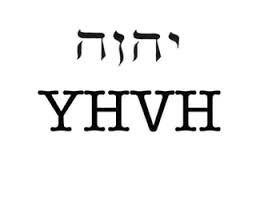
Long before Yeshua’s day, the word ADONAI had, out of respect, been substituted in speaking and in reading aloud for God’s personal name, the four Hebrew letters yod-heh-vav-heh, variously written in English as YHVH. The Talmud (Pesachim 50a) made it a requirement not to pronounce the Tetragrammaton, meaning the four-letter name of the LORD, Yod-Hey-Vav-Hey, since the ancient manuscripts do not give any vowel sounds, and this remains the rule in most modern Jewish settings. In deference to this tradition, which is unnecessary but harmless, I will be using ADONAI where YHVH is meant. In ancient times when the scribes were translating the Hebrew Scriptures, they revered the name of YHVH so much that they would use a quill to make one stroke of the name and then throw it away. Then they would make another stroke and throw that quill away until the name was completed. His name became so sacred to them that they started to substitute the phrase the Name, instead of writing or pronouncing His Name. Over centuries of doing this, the actual letters and pronunciation of His Name were lost. The closest we can come to is YHVH, with no syllables. The pronunciation has been totally lost. Therefore, the made-up name “Yahweh” is only a guess of what the original name sounded like. Both ADONAI and Ha’Shem are substitute names for YHVH. ADONAI is more of an affectionate name like daddy, while Ha’Shem is a more formal name like sir. Therefore, Jews, being respectful of the Third Commandment, use these words as replacements. The Talmud explains, “In the Sanctuary, the Name was pronounced as written; but beyond its confines a substitute Name was employed (Tractate Sotah VII.6). God has only one name, YHVH. All His other “names” like ADONAI Elohei-Tzva’ot, ADONAI Elohim, ADONAI Nissi, ADONAI Tzidkenu, and ADONAI-Tzva’ot, merely reflect His attributes.
Contrary to what some religious groups say today, no one can say with confidence how to pronounce God’s Name. The “name” Jehovah, for example, is a made-up word by a Franciscan monk in the dark ages. He took YHVH, and inserted vowels between the known letters to invent a new word: YeHoVaH. Jews never, NEVER, use this made-up word. The last book of the B’rit Chadashah tells us that when Yeshua returns to the earth, He will reveal the Name that no one knew but Himself (Revelation 19:12). It seems best to leave this lost pronunciation unresolved until the Messiah comes.
Every spiritual blessing: God has done so much for His children, yet some seem discontented, as if the Father is holding out on them. Some believers are always looking for a new blessing or experience to validate their faith in Messiah. Sha’ul emphasizes here that we already have every blessing available through the work of Yeshua. True, we may not always be experiencing all those blessings, but the problem is not that God is withholding from us but that we are not fully appropriating those spiritual blessings. Evidently, we do not need more of God, but He needs more of us.55
In the heavenly places: The abundant, unlimited blessings from God are in the heavenly places. More than heaven itself is included. The heavenly place (Ephesians 1:20, 2:6, 3:10) encompass the entire supernatural realm of ADONAI, His complete domain, the full extent of His divine operation. Therefore, believers have a paradoxical, two-level existence – a dual citizenship. While we remain on the earth, we are citizens of the earth. Yet, in Messiah, our primary and infinitely more important citizenship is in heaven. But we are citizens of heaven, and it is from there that we expect a Deliverer, the Lord Yeshua the Messiah (Philippians 3:20). That is why we are to seek things above, where the Messiah is sitting at the right hand of God (Colossians 3:1). Because we are members of God’s domain, unlike the worldly (Luke 16:8), we are able to understand the supernatural things of God, things which the natural man does not accept and cannot understand . . . because they are spiritually discerned (First Corinthians 2:14).
As citizens of God’s heavenly dominion, believers hold all the rights and privileges that citizenship grants, even while we are living in the “foreign” and sometimes hostile land of earth. Our true life is in the supernatural, the heavenly places. Our Father is there, our Savior is there, our saved family members and loved ones are there, our name is there, and our eternal dwelling place and throne are there. But we are presently trapped in the tension between the earthly and the heavenly. Paul reflected this tension when he said: We are afflicted in every way, but not crushed; perplexed, but not despairing; persecuted, but not forsaken; struck down, but not destroyed . . . as sorrowful yet always rejoicing, as poor, yet making many rich, as having nothing yet possessing all things (Second Corinthians 4:8-9 and 6:10). The key to living as a heavenly citizen while living in an unheavenly situation is walking by the Ruach. Rabbi Sha’ul declares that we should walk by the Ruach (see the commentary on Galatians Bv – Walk by the Ruach, and Not the Desires of the Flesh). When we walk in His power, He produces fruit in us: love, joy, peace, patience, kindness, goodness, faithfulness, gentleness, and self-control (Galatians 5:22-23). We receive our heavenly blessing by living in the power of the Ruach Ha’Kodesh.
Dear Heavenly Father, Praise Your Awesome love to bless me with every spiritual blessing “in Messiah”! Your gracious love is so big that You promise me Every spiritual blessing and You deliver that promise “in Messiah.” His sacrificial death and resurrection opened the path to heaven. You chose the path to be “in Messiah”. The path to heaven is not in just anyone, but only thru the one sinless and spotless Lamb of God (John 1:29). All those outside of Yeshua died and are still dead. Only Messiah Yeshua has conquered/defeated death and only Messiah Yeshua lived a perfect life without sin.
Before You created the world, You knew that mankind could never be good enough to save itself. Since You are holy, the only way for You to fellowship with anyone is if they are holy and so you planned for Holy Messiah Yeshua to bear the sins of mankind. All inhabitants of the earth will worship the beast – all whose names have not been written in the Lamb’s book of life, the Lamb who was slain from the creation of the world (Revelation 13:8). All who choose to love and trust Messiah Yeshua, get on His path of holiness by being adopted as God’s children. Thank you for my adoption, giving me the right to enter Your holy heavenly home and live with You eternally!
Praise You for Your Awesome Love! I want to thank You for Your love and blessings by blessing You back by living my life in loving obedience as best I can, sharing Your greatness with others and making time to talk with You in prayer. In Messiah Yeshua’s holy name and power of His resurrection. Amen




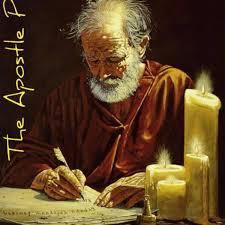


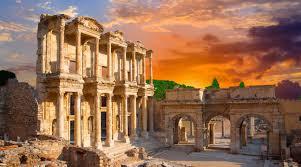
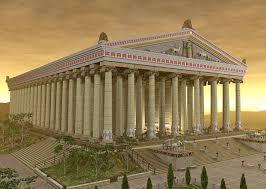
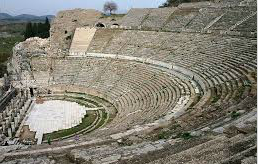
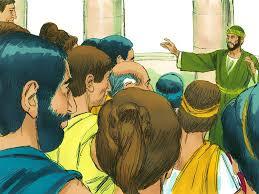

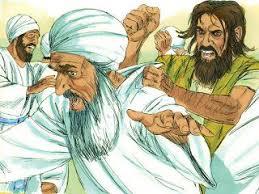


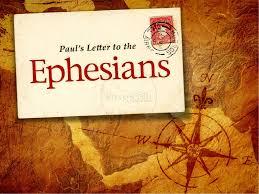

 பரலோக ராஜ்ஜியத்தின் முரண்பாடான மதிப்புகள் அவற்றின் உச்சக்கட்டத்தை கிட்டத்தட்ட ஒரு ஆக்சிமோரானில் அடைகின்றன, ஏனெனில் ஒரு
பரலோக ராஜ்ஜியத்தின் முரண்பாடான மதிப்புகள் அவற்றின் உச்சக்கட்டத்தை கிட்டத்தட்ட ஒரு ஆக்சிமோரானில் அடைகின்றன, ஏனெனில் ஒரு  பரிசேயர்கள் தோராவை உண்மையில் அது பழிவாங்குதல் மற்றும் சமமான பழிவாங்கலை அனுமதித்தது என்று பொருள்படும் (யாத்திராகமம் 21:24; லேவியராகமம் 24:20; உபாகமம் 19:21). எனவே, மேசியா தனது போதனையை வார்த்தைகளுடன் தொடங்கினார்:
பரிசேயர்கள் தோராவை உண்மையில் அது பழிவாங்குதல் மற்றும் சமமான பழிவாங்கலை அனுமதித்தது என்று பொருள்படும் (யாத்திராகமம் 21:24; லேவியராகமம் 24:20; உபாகமம் 19:21). எனவே, மேசியா தனது போதனையை வார்த்தைகளுடன் தொடங்கினார்: நசரேய
நசரேய 
 அவரது உன்னதமான பாணியில், மேசியா தோராவின் ஆழமான உள்நோக்கத்தை வெளிப்படுத்துகிறார்:
அவரது உன்னதமான பாணியில், மேசியா தோராவின் ஆழமான உள்நோக்கத்தை வெளிப்படுத்துகிறார்:  ஆனால், மாஸ்டர் அவர் கூறியபோது பிரச்சினையின் மையத்தைத் தாக்கினார்:
ஆனால், மாஸ்டர் அவர் கூறியபோது பிரச்சினையின் மையத்தைத் தாக்கினார்: